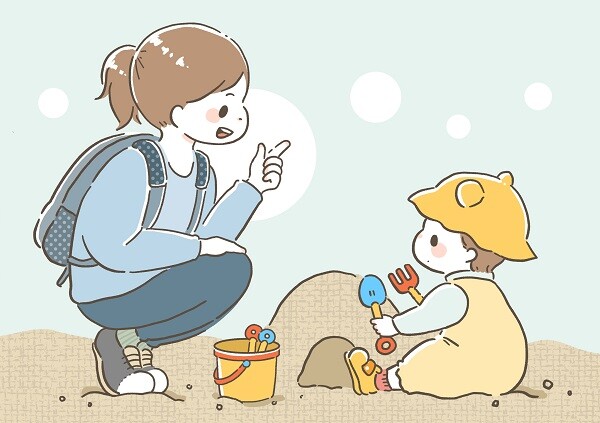There are seven moments that make children feel loved, connecting parents’ and children’s hearts, warming and illuminating each other.


Don’t compare children to others, but focus on their growth
Psychologist Leon Festinger pointed out that people have a natural self-evaluation instinct, which is to compare themselves to others. To parents, children seem to be a part of their self-evaluation process.
In fact, subtle parents will not compare their children’s weaknesses to others’ strengths. Instead, they stimulate motivation through affirmation.
Forrest Gump, in the movie “Forrest Gump,” was born with a disability and a low IQ, and had to wear leg braces to walk.
To erase her son’s sense of inferiority, his mother told him: “These are precious shoes that will take you around the world.”

Due to his IQ of 75, the principal suggested that his mother enroll Forrest in a special school.
But the mother insisted that Forrest Gump receive the same education as everyone else.
With his mother’s efforts, Forrest Gump was eventually accepted into the school.
His mother constantly told Forrest Gump: “You are just like everyone else; there is no difference.”
Forrest Gump also always kept his mother’s words in mind and read books, exercised, and participated in sports like everyone else.
His life also continued to have breakthroughs. From a football player to a business tycoon, Forrest Gump worked hard and eventually became an extraordinary man.
Parental recognition is a beacon for children to move forward, sowing seeds of confidence and perseverance in their hearts.
This helps children understand that each person is unique, and as long as they have the courage to be themselves, they can shine brightly.

Don’t scold children when they do something wrong, but comfort them with “it’s okay”
A boy accidentally knocked over a glass of fruit juice, leaving a mess on the table. Instead of getting angry, his father smiled, took a paper towel, and cleaned up the mess with his son.
Seeing his son’s guilty and anxious look, the mother comforted him: “It’s okay; let’s clean it up together!” After hearing his mother’s words, the boy immediately smiled again.
This scene made many people realize that making a mistake doesn’t always lead to scolding.
The French writer Romain Rolland once said: “In life, you should do something wrong. If you make a mistake, you will learn from it.”
When children make mistakes, parents are advised to remain calm and friendly, modeling emotional and intellectual responses for their children.
A parent’s attitude determines the child’s attitude toward life. When not blamed, children feel safer and more optimistic.
If parents create a peaceful, comfortable, and relaxed family atmosphere, they transmit happiness to their children.


Don’t be quick to deny their opinions; allow children to be themselves
The famous American psychologist Carl Rogers once said, “Parents should encourage children to express their thoughts and feelings rather than suppress their challenges.”
Children occasionally being “disobedient” is actually part of their growth process.
Enli, a mother whose son Yi Nengjing liked to wear women’s clothes and behaved somewhat rebelliously, did not blame him when he faced doubts from the outside world. Instead, she accepted his differences and looked for ways to support him. All of this seemed to provide enough support for Enli, who graduated early from New York University at the age of 22.
A psychologist once said that parents have the important task of helping children strengthen their inner strength so that they have the ability and courage to face the future world.
Each child has their own emotions and experiences, and these emotions are equally important and genuine.
Parents should accept, respect, and listen to their children’s emotions and try to understand their inner world to establish a closer relationship.


Understand the reasons behind lies and encourage children to face them bravely
According to the Institute for Child Study at the University of Toronto in Canada, 20% of children will lie when they are two years old. When children turn three, this value reaches 50%, and by age four, it reaches nearly 90%.
In most cases, children’s lies stem from a natural instinct to avoid punishment.
For example, children may lie about their grades to avoid being scolded.
As the philosopher Russell said: “Dishonesty in children is almost always the result of fear.”
When telling the truth demands a price, children will naturally choose to lie.
Therefore, when children make mistakes, parents are advised not to be too harsh. Instead, focus on helping them recognize their mistakes and make amends.
Let children understand that making mistakes is not too scary, and having the courage to face them honestly is more important.


Accept their sensitivity and allow children to have negative emotions
Expert Fan Deng once said that when children lose their temper and scream and roll around, it is because they don’t have any other skills besides this.
Therefore, parents should teach children how to express their emotions appropriately.
For example, if a child is upset because a classmate broke their toy, guide them to express their emotions and say, “I’m very angry. You used my toy, and now it’s broken. What are you going to do to make it up to me?”
The process of helping children express their emotions through words is actually about guiding them back to a rational and calm state after the emotional storm.
American child psychologist Becky Kennedy said, “Beneath the anger, we see children enduring increasing pain.”
There is no irrational anger, only invisible thoughts and demands. Children lose their temper because their psychological needs are not being met.
Look for the hidden demands behind their sensitivity, help them release and channel their anger in a reasonable way. In this way, children can step out of the quagmire of emotions and gradually gain control over them.


Don’t force children to share; allow them the right to refuse
Some data shows that after the age of two, children enter a sensitive stage regarding property rights, beginning to recognize ownership of their belongings and expressing a sense of protection over them.
In fact, when children protect their rights, they learn to respect the rights of others.
In daily life, parents may inadvertently ask their children to lend their toys to others. However, as children become more aware of their rights, they may start to resist such requests. Therefore, instead of forcing them, give them the choice.
Parental understanding and support are the strongest pillars for children’s growth, enabling them to stand up for themselves firmly and treat others kindly.
Lu Xun once said, “Education stems from love.”
Education is like planting a tree; love is the soil that nourishes it. While parents teach their children knowledge and skills, the most important thing is for them to feel loved.
Sometimes, parents may use rewards or punishments to make their children obedient, but this is only a temporary solution.
True love is about acceptance, acknowledging children for who they are, regardless of their academic performance.
From this, children can feel warmth and safety and learn to become stronger and more confident.
Because love has its own power, it fills children’s worlds with sunshine and enables them to achieve happiness.
“The 3 Life Transition Stages: Nurturing Children Towards a Successful Future”
The journey of parenthood is full of surprises as your child grows and develops. Their personalities, behaviors, and psychological needs evolve, and so it’s important for parents to adapt their parenting techniques accordingly. Understanding the unique needs of your child at each stage of their life is key to providing them with the best care and support.
The 4 Types of Praise That Boost Kids’ Confidence and Intrinsic Motivation
Praise from parents is a powerful motivator for children to strive for excellence. When children receive genuine and specific recognition for their accomplishments, it boosts their self-esteem, encourages a growth mindset, and fosters a positive parent-child relationship. This type of praise serves as a catalyst for children to continue pushing themselves to new heights and develop a strong sense of self-worth.
“The 3-Pronged Approach to Parenting: Nurturing Well-Rounded and Successful Children”
As parents, we all aspire to raise our children to be successful and well-rounded individuals. However, it is important to recognize that traditional textbook education may not always be the best approach for our little ones. It is crucial to explore alternative methods and tailor our teaching strategies to suit their unique needs and learning styles. By embracing a diverse range of educational tools and embracing each child’s individuality, we can empower them to reach their full potential and thrive in their own unique way.




































